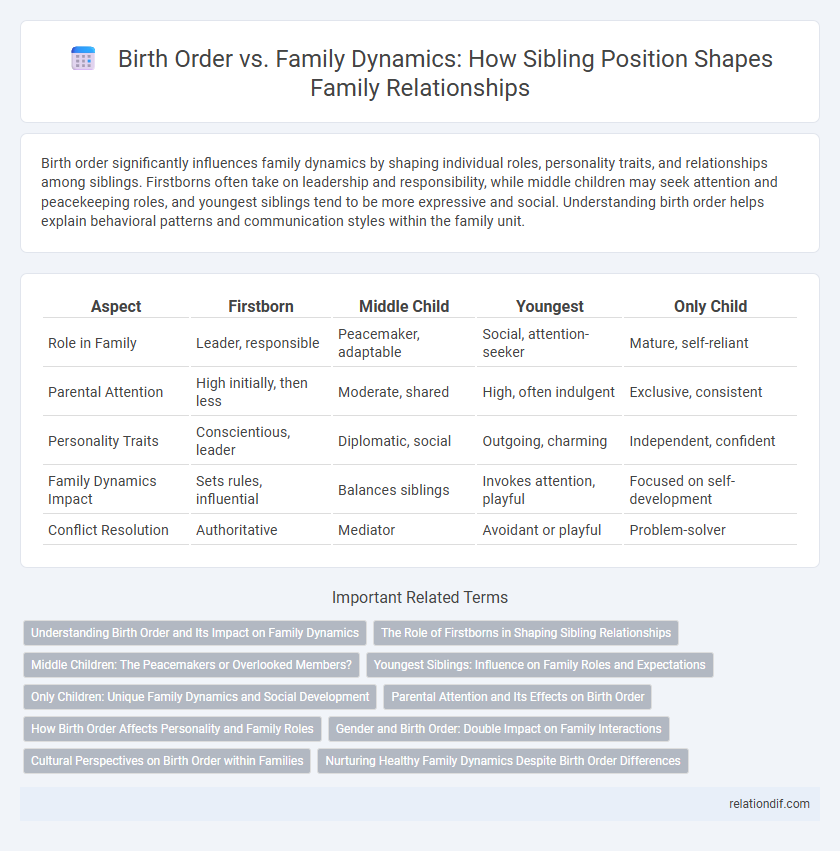Birth order significantly influences family dynamics by shaping individual roles, personality traits, and relationships among siblings. Firstborns often take on leadership and responsibility, while middle children may seek attention and peacekeeping roles, and youngest siblings tend to be more expressive and social. Understanding birth order helps explain behavioral patterns and communication styles within the family unit.
Table of Comparison
| Aspect | Firstborn | Middle Child | Youngest | Only Child |
|---|---|---|---|---|
| Role in Family | Leader, responsible | Peacemaker, adaptable | Social, attention-seeker | Mature, self-reliant |
| Parental Attention | High initially, then less | Moderate, shared | High, often indulgent | Exclusive, consistent |
| Personality Traits | Conscientious, leader | Diplomatic, social | Outgoing, charming | Independent, confident |
| Family Dynamics Impact | Sets rules, influential | Balances siblings | Invokes attention, playful | Focused on self-development |
| Conflict Resolution | Authoritative | Mediator | Avoidant or playful | Problem-solver |
Understanding Birth Order and Its Impact on Family Dynamics
Birth order plays a significant role in shaping individual personalities and family dynamics by influencing behavior, responsibilities, and communication patterns among siblings. Firstborns often assume leadership roles and exhibit responsibility, middle children tend to develop negotiation skills and seek attention, while youngest siblings may be more social and spirited due to parental attention differences. Understanding these patterns helps families navigate conflicts, improve relationships, and foster a supportive environment tailored to each member's unique needs.
The Role of Firstborns in Shaping Sibling Relationships
Firstborns often assume leadership roles within family dynamics, influencing sibling interactions through responsibility and authority. Their position can shape conflict resolution patterns and establish behavioral expectations among younger siblings. Studies show that firstborns contribute significantly to the emotional climate of sibling relationships by modeling social and communication skills.
Middle Children: The Peacemakers or Overlooked Members?
Middle children often navigate unique family dynamics, balancing between older and younger siblings while striving for identity and attention. They commonly develop strong peacemaking skills, mediating conflicts and fostering harmony within the family unit. Despite their vital role, middle children may experience feelings of being overlooked, influencing their social behavior and emotional development.
Youngest Siblings: Influence on Family Roles and Expectations
Youngest siblings often experience distinct family roles and expectations, typically being seen as the family's peacemakers or the most pampered members. Their birth order can influence how parents and older siblings interact with them, often leading to more leniency and attention, which shapes their personality and social behaviors. Research indicates that youngest children tend to develop strong social skills and adaptability due to their unique position within family dynamics.
Only Children: Unique Family Dynamics and Social Development
Only children experience unique family dynamics characterized by undivided parental attention and resources, which often lead to accelerated intellectual and emotional development compared to siblings. The absence of sibling interactions can result in distinct socialization patterns, where only children tend to develop strong adult-oriented communication skills but may face challenges in peer conflict resolution. Understanding these dynamics is crucial for fostering balanced social development and addressing common misconceptions about only children's behavior and personality traits.
Parental Attention and Its Effects on Birth Order
Parental attention often varies based on birth order, with firstborn children receiving more focused guidance and expectations, which can foster leadership skills and responsibility. Middle children frequently experience less direct parental attention, influencing their development of social adaptability and strong peer relationships. Lastborns tend to receive more pampering and leniency, which may impact their confidence and risk-taking behavior within family dynamics.
How Birth Order Affects Personality and Family Roles
Birth order significantly influences personality traits and family roles, with firstborns often exhibiting leadership qualities and a strong sense of responsibility due to parental expectations. Middle children tend to develop negotiation skills and adaptability as they navigate their position between siblings, while youngest children frequently display sociability and creativity, benefiting from a more relaxed family environment. These dynamics shape interaction patterns and individual identities within the family system, impacting communication styles and emotional development.
Gender and Birth Order: Double Impact on Family Interactions
Gender and birth order create a double impact on family interactions by shaping distinct roles and expectations for each child. Firstborn boys often experience heightened pressure to lead and protect, while firstborn girls may face early caregiving responsibilities that influence their assertiveness and empathy. Later-born children, influenced by gender norms, frequently adopt more adaptable and conciliatory roles, affecting sibling dynamics and overall family cohesion.
Cultural Perspectives on Birth Order within Families
Cultural perspectives on birth order significantly influence family dynamics, as cultures attribute distinct roles and expectations to firstborns, middle children, and youngest siblings. In many Asian societies, firstborns often bear the responsibility of leadership and caregiving, while in Western cultures, middle children may be seen as peacemakers or independents. These cultural norms shape individual behaviors, sibling relationships, and parental expectations within the family unit.
Nurturing Healthy Family Dynamics Despite Birth Order Differences
Understanding birth order provides valuable insights into sibling personality traits and familial roles, helping to tailor parenting strategies that address individual needs. Emphasizing open communication, empathy, and mutual respect fosters an environment where each family member feels valued, reducing rivalry and enhancing cooperation. Prioritizing inclusive activities and shared responsibilities strengthens family bonds, promoting resilience and harmony despite birth order differences.
birth order vs family dynamics Infographic

 relationdif.com
relationdif.com